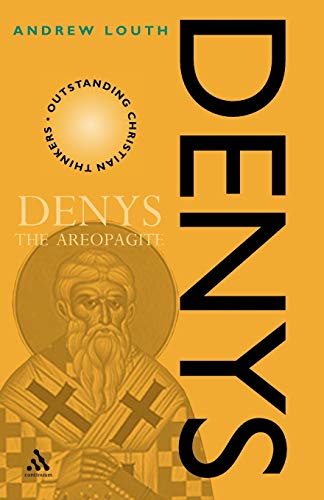

Denys the Areopagite (Outstanding Christian Thinkers)
J**E
Superb introduction to Pseudo-Dionysius
Great little book!
G**G
Denys the Areopagite
Denys the Areopagite is the author attributed to a modest corpus of writings whose influence on Christian thought and spirituality cannot be under-estimated. To a certain extent, the statement by Whitehead that all philosophy is a footnote to Plato might be applied to Dionysius - all Christian spirituality is a footnote to Denys. This might seem extreme, but any serious student of Christian theology and spirituality will soon become familiar with the Areopagite's writings.Who the actual writer was is a mystery. He was probably an Eastern Christian monk and theologian (possibly a churchman or a Bishop) living in Syria in the late 4th/5th century A.D. While we know nothing about the writer himself, he was clearly a theological genius of the highest order and he also managed to synthesize so many currents of Christian and pagan thought into such a remarkable system, his intelligence and deep contemplative bent cannot be doubted. What is clear is that two streams of thought converged for Dionysius - firstly, the Greek Neo-Platonic tradition as exemplified in Plotinus, Proclus and Iamblichus, and the Greek Christian tradition, as exemplified by Origen, the Cappadocians, and Evagrius of Pontus. Both systems emphasized an infinite, incomprehensible and unknowable First Principle that creates the world out of sheer goodness and plenitude of Being, combined with a complex dialectic between 'exit' or 'creation' or 'emanation' from the First Principle, the current journey of return, and the eventual 'deification' of creation as it returns like a river going to the sea (a common image to both traditions).Denys uses this vast framework to create a 'cosmological' liturgical/mystical theology, which includes the various economies of creation, salvation and redemption, combined with a central focus on deification, as mediated by the church and contemplative prayer. Denys's system has been far more influential in the Orthodox and Eastern version of Christianity, where to this day St Denys is celebrated as a great Orthodox saint and theologian of the church, even though most Orthodox theologians accept 'Denys' is not a disciple of St Paul (as he claims in his writings).His reception in the West has been somewhat more mixed, especially since the Reformation. The magisterial Reformers denounced Denys as something of a heterodox thinker (Luther remarked there was too much pagan Platonism in his thought) and Calvin thought his speculations were due to his imagination than divine inspiration. Catholics have also been more critical of him in recent times, claiming his apophatic views about God are not compatible with the doctrine God's essence can be seen and understood (at least in heaven) and his theology of the Incarnation seems to be Monophysite.I must leave readers to come to their own conclusions. This summary though of Denys's thought by Andrew Louth, an Orthodox priest and theologian, should help those interested in Denys to better understand his theology.
R**N
Excellent service
This book service delivered a copy in excellent condition, and did so in a very short time. I'm very pleased.
E**Y
The mystical theology of Dionysius
The anonymous writer under the pseudonym of one of St Paul's converts, Dionysius (or Denys) the Areopagite, is an important figure in Christian theology, drawing from Neoplationism including the work of Plotinus and Proclus , as well as from earlier church fathers such as Clement of Alexandria , Origen and the Cappadocians ( Gregory of Nyssa and Gregory of Nazianzus ), and influencing in his turn figures like Maximus the Confessor and John Scottus Eriugena .Andrew Louth examines the works of Dionysius via chapters entitled "Liturgical Theology" (Dionysius' theology as drawn together by liturgy), "The Angelic Choirs" (the famous celestial hierarchy), "The Earthly Liturgy" (the mirroring of the celestial hierachy on earth), "The Nameless God of Many Names" (cataphatic and apophatic theology), "Visions and Darkness", and "The Afterlife".A relatively short book and a little hard going and dense at times, perhaps not helped by its brevity and trying to cram a lot in. Whilst not a direct commentary on Dionysius' works as such, it would probably best be read in conjunction with them. William Riordan's Divine Light: The Theology of Denys the Areopagite is overall a better companion to get I think. PlotinusProclusClement of AlexandriaOrigenGregory of NyssaGregory of NazianzusMaximus the ConfessorJohn Scottus Eriugenaworks of DionysiusDivine Light: The Theology of Denys the Areopagite
Trustpilot
1 month ago
1 week ago